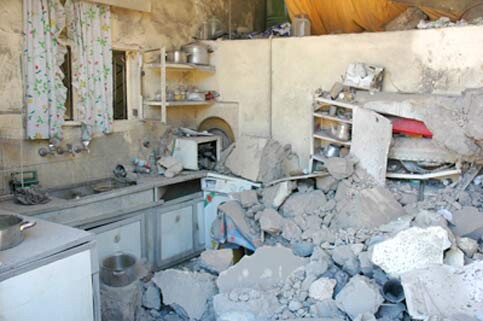south Lebanon 2 August 2006

The home of a local resident of Baalbek following an Israeli air strike, 1 August 2006. (Peter Speetjens/IRIN)
I just came from the South of Lebanon. I went to Tyre, to Hannaoui, Qana, Siddiqinne, Srifa, Bint Jbeil, Ainata, and Ein Ebel and many villages on the way. I so want to write, but I still have no words. This was Tyre, after all, the lovely city and its beach that I always wanted to call home. These were the villages at which I made friends, aided in tobacco harvesting and drank the best tea ever. I still haven’t cried, I feel I am not entitled to. If I were to cry, what would I leave to the people that have lost loved ones and houses full of memories?
The spaces once full of friendly old men and women inviting any passer by, stranger or friend alike, to coffee, tea and grapes are now empty. The children no longer play football on the edge of the road, or roll wooden self-made toys in the alleys. The late night gatherings under grape trees have gone. Their voices are now replaced by debris, dogs and dying cows. There is nobody in Siddiqinne. I tried to check on Mariam’s house but the road is too full of rubble for me to get there. I looked for one familiar face to say hello to, to ask how things have been, but there is no one there.
I went to Ainata to search for a friend’s mother. The cease-fire is coming to an end and I am deep in the Bint Jbeil area. I have to return, I don’t know the house, there are very few people to help, but I insist on looking further. Zainab, I say, Hussein’s mother; I describe his profession, his wife, again and again until I find he who knows the house. I climb the rubble. The house is half destroyed. I know this was the kitchen because of the plates squeezed under the rubble; she might have been there making a cup of tea I think, trying to squeeze normality into my presence in the house I have never visited before. There is no bathroom for me to identify, it is gone. I can’t know if she is there but I don’t have the heart to leave her son in the agony of ignorance. I approach seeking a different smell. I can’t believe that this is the way one look’s for a mother’s friend. Is it me doing this? But I am doing it; I have been smelling deaths for two days now. I still can’t know. I was hoping I would come and she would be in the house, waiting for somebody to help her through the difficult terrain, then I would call her son when in Tyre to say I have your mother with me and I am bringing her to Beirut. I was imagining the relieved smile on his face. This didn’t happen.
On the way I get a call; somebody from the Red Cross says they transferred a body of an unidentified woman from Ainata. I find myself wishing it would be her. I want them to at least know. If this cease-fire ends without finding her, they will be spending many hard days. I go around one hospital after another, it is chaotic. We can’t see the bodies; we can’t find others who know her in the hospital. I have no consoling words for Hussein.
Today, hours before we head back to Beirut from Sidon, we know that the burial of all the bodies - too many to be kept in the ill-equipped hospital - is taking place at noon. There is no way any member of her family can get to Tyre in Time. Maher decides to go. The cease fire has ended, the roads are no longer safe, but the risk is worth going through. I think there is only one loss greater than the death of a loved one — that of not knowing. He is there now, the burial is delayed and Hussein has arrived. I can’t reach them by phone, they have no signal, and I write these words as I wait.
There is a lot to be told, the many stories I have encountered. I have pictures to share, and I will, I promise; but now I need to go, to talk to the families waiting to hear about their homes. The stories have to be told first to those who own them.
Related Links
Muzna Al-Masri is a human rights education activist in Beirut with an MA in Conflict Transformation and Peacebuilding.



